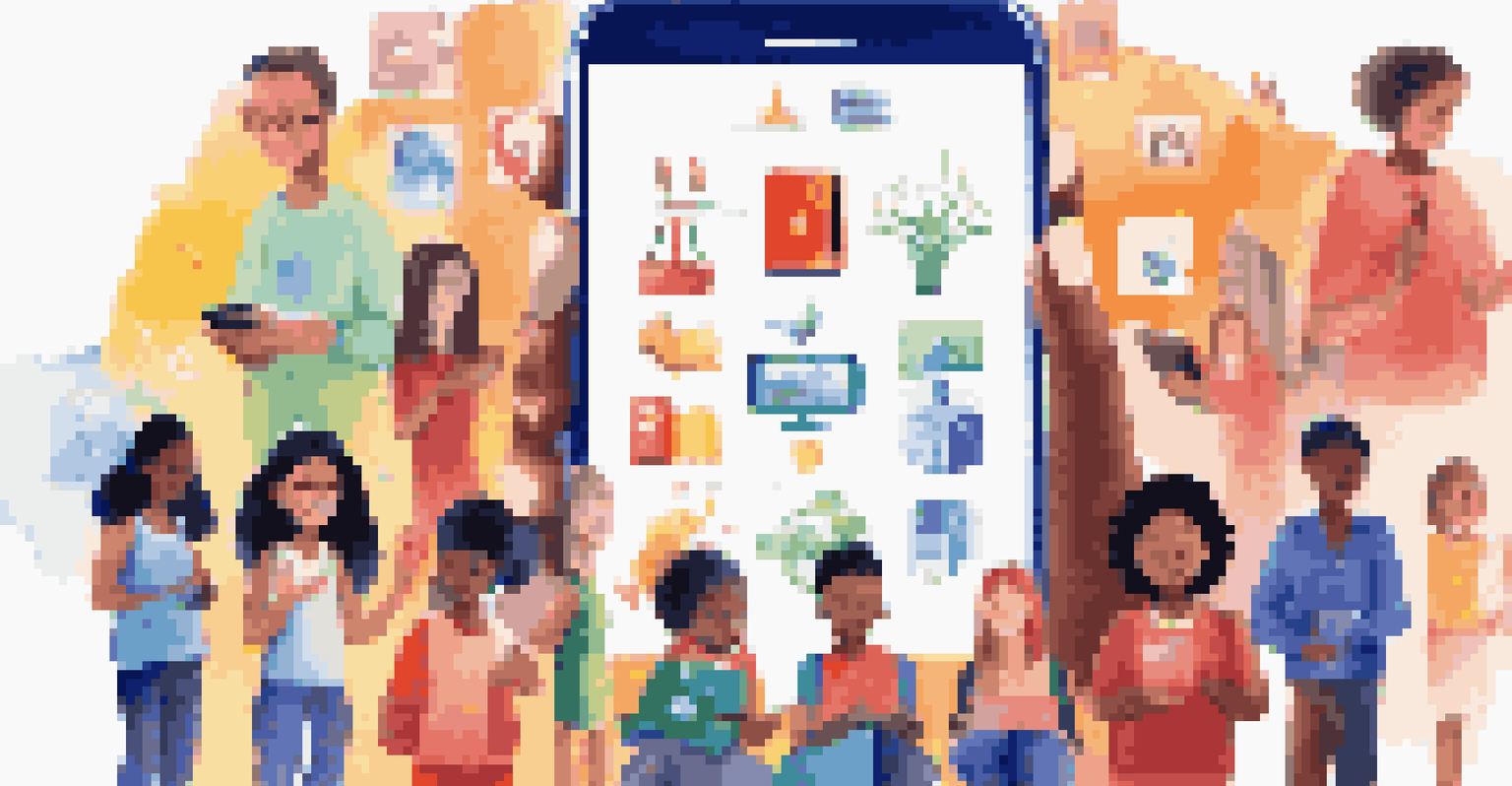Mobile Learning for Social Justice: Educating for Equity

Understanding Mobile Learning and Social Justice
Mobile learning refers to educational opportunities that utilize mobile devices, allowing learners to access information anytime, anywhere. This form of learning has significant implications for social justice, as it can help bridge the gap in educational access for marginalized communities. With smartphones and tablets in hand, individuals who may not have traditional resources can still engage in meaningful learning experiences.
Technology is best when it brings people together.
Social justice in education aims to ensure that all individuals, regardless of their background, have equal opportunities to succeed. By combining mobile learning with social justice principles, we can create accessible pathways for education that empower underrepresented groups. This approach not only fosters equity but also encourages a more inclusive learning environment.
Moreover, mobile learning tools can facilitate community engagement, allowing learners to connect with peers and mentors. This connectivity can lead to collaborative problem-solving and the sharing of diverse perspectives, enriching the learning experience and promoting social justice initiatives.
The Rise of Mobile Technology in Education
In recent years, the prevalence of mobile technology has transformed the educational landscape. With billions of people owning smartphones, educators have begun to harness this potential, creating engaging content that can be accessed on-the-go. This shift has made learning more flexible, catering to diverse learning styles and schedules.

Mobile technology not only makes education more accessible but also encourages lifelong learning. Individuals can pursue courses, workshops, and resources that align with their interests and needs, regardless of their location. This democratization of education is crucial in addressing systemic inequalities faced by many communities.
Mobile Learning Enhances Equity
Mobile learning provides accessible educational opportunities that can empower marginalized communities and promote social justice.
As mobile technology continues to evolve, so do the opportunities for innovative educational approaches. From gamified learning apps to online forums, the ways in which we can educate for equity are becoming increasingly varied, providing exciting possibilities for transformative social change.
Challenges in Mobile Learning for Marginalized Groups
While mobile learning offers many benefits, it is essential to acknowledge the challenges faced by marginalized groups. Access to devices and reliable internet can be significant barriers, limiting the reach of mobile education initiatives. Without addressing these disparities, the promise of mobile learning for social justice may fall short.
Education is the most powerful weapon which you can use to change the world.
Additionally, digital literacy is a crucial factor in ensuring effective mobile learning experiences. Many individuals from underserved communities may lack the necessary skills to navigate mobile platforms, hindering their ability to engage fully with the content. Educators and organizations must prioritize digital literacy training to empower these learners.
Finally, content relevance is key to effective mobile learning. Educational materials must resonate with the lived experiences of marginalized individuals to foster engagement and understanding. By collaborating with community members to develop culturally relevant content, we can create more impactful mobile learning experiences.
Successful Examples of Mobile Learning for Social Justice
Several organizations are leading the charge in using mobile learning to promote social justice. For instance, apps like Khan Academy provide free educational resources tailored to diverse learners, breaking down barriers to access. Such platforms empower learners to take control of their education, regardless of their socio-economic status.
Another example is the use of mobile learning in refugee education. Initiatives like the 'Learn with Refugees' program leverage mobile technology to deliver essential skills and knowledge to displaced individuals. These targeted efforts not only educate but also foster a sense of community and belonging among learners.
Challenges for Marginalized Learners
Barriers like access to devices and digital literacy skills can hinder the effectiveness of mobile learning initiatives for underserved groups.
Moreover, local nonprofits are utilizing mobile learning to address specific community needs. By creating apps that focus on financial literacy, health education, or job readiness, they are equipping individuals with the tools necessary to thrive in society. These successes highlight the potential of mobile learning to drive meaningful change.
Engaging Educators in Mobile Learning for Equity
Educators play a pivotal role in the success of mobile learning initiatives aimed at promoting equity. By embracing mobile technology, teachers can create dynamic and interactive learning experiences that cater to various student needs. Professional development focused on mobile learning strategies can empower educators to integrate these tools effectively.
Collaboration among educators is essential to share best practices and resources. Online platforms and social media can facilitate connections between teachers working towards similar goals, enabling them to learn from one another. This sense of community not only enhances teaching methods but also fosters a collective commitment to social justice.
Furthermore, educators can advocate for policy changes that support mobile learning initiatives. By raising awareness about the importance of equitable access to education, they can influence decision-makers to allocate resources and funding for mobile technology in underserved areas. This advocacy is crucial in creating a more just educational landscape.
The Role of Communities in Supporting Mobile Learning
Communities are vital stakeholders in the pursuit of mobile learning for social justice. By actively participating in educational initiatives, community members can help identify specific needs and challenges faced by learners. This grassroots involvement fosters a sense of ownership and ensures that programs are tailored to the community's unique context.
Moreover, local organizations can provide essential resources and support to enhance mobile learning efforts. For example, community centers can offer internet access, device lending programs, or digital literacy workshops, creating a supportive environment for learners. These initiatives help mitigate barriers and empower individuals to engage with mobile education.
Community Involvement is Key
Active participation from communities can help tailor mobile learning programs to specific needs, enhancing their effectiveness and relevance.
Finally, community feedback is crucial for continuous improvement of mobile learning programs. By listening to the voices of learners and their families, organizations can adapt their strategies to better meet the needs of the community. This collaborative approach not only strengthens educational initiatives but also reinforces the commitment to social justice.
Looking Ahead: The Future of Mobile Learning for Social Justice
As we look to the future, the potential for mobile learning to drive social justice is immense. With ongoing advancements in technology, we can expect to see even more innovative approaches to education that prioritize equity. This evolution will require collaboration among educators, organizations, and communities to maximize the impact of mobile learning.
Moreover, the integration of artificial intelligence and personalized learning experiences can further enhance mobile education. By tailoring content to individual learners’ needs and preferences, we can create more effective and engaging educational pathways. This customization will be critical in supporting diverse learners and addressing systemic inequalities.

Ultimately, the journey towards equity in education through mobile learning is ongoing. By remaining committed to social justice principles and actively working towards inclusive solutions, we can create a brighter future for all learners, ensuring that everyone has the opportunity to succeed.